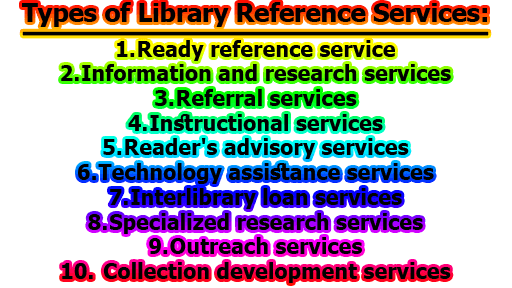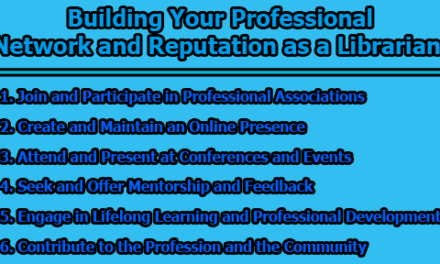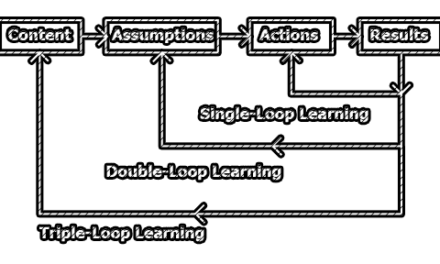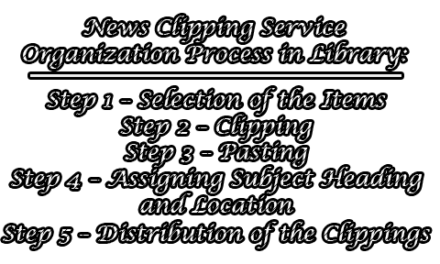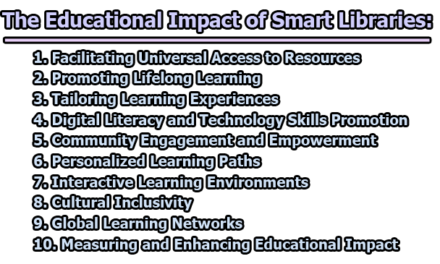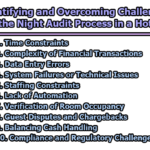The Reference Service of a library is a service provided to library users to help them find information and resources to meet their research needs. Reference librarians are trained professionals who can help users navigate the library’s collections, databases, and other resources, as well as offer assistance with research strategies and techniques. Reference librarians can provide assistance in person, over the phone, by email, or through online chat services. They can help users find information on a wide variety of topics, ranging from academic research to personal interests. They may also provide instruction on how to use library resources, such as databases, citation management tools, and other research tools. The Reference Service is an important component of any library, as it helps to connect users with the information they need to succeed in their academic or personal pursuits. In the rest of this article, we are going to know about types of library reference services, functions, necessary, and design effective reference services in an academic library.
Types of Library Reference Services:
There are several types of Library Reference Services that libraries can offer to their users. These services include:
1. Ready reference service: This is the most basic type of reference service, which involves answering simple questions that can be quickly answered with a quick reference source or resource, such as a dictionary or encyclopedia.
2. Information and research services: This type of service involves assisting users in finding information on specific topics, helping them navigate complex databases, and guiding them through the research process.
3. Referral services: This service involves directing users to resources and services that are available outside of the library, such as other libraries, government agencies, or community organizations.
4. Instructional services: This service involves providing users with instructions on how to use library resources and research tools, such as online databases, citation management tools, and other research tools.
5. Reader’s advisory services: This service involves assisting users in finding books and other materials that match their interests and reading levels.
6. Technology assistance services: This service involves helping users with technical issues related to library resources, such as setting up accounts, accessing e-books, and troubleshooting technical issues.
7. Interlibrary loan services: This service involves helping users obtain materials that are not available in the library’s collection by borrowing them from other libraries.
8. Specialized research services: This type of service is focused on helping users with specialized research needs, such as in-depth research for graduate-level studies or research in a specific subject area.
9. Outreach services: This service involves going beyond the library walls to serve patrons in the community, such as through bookmobile services, outreach to schools and community groups, or providing library services to underserved populations.
10. Collection development services: This service involves assisting users in building a personal or professional library collection, providing recommendations and guidance on what materials to acquire and how to manage and organize them. This service is often provided to businesses, non-profits, or other organizations, as well as to individuals.
The specific types of reference services offered by a library may vary depending on the library’s resources and the needs of its users.
Functions of Library Reference Services:
Some of the functions of library reference services are given below:
- Assisting users in finding and accessing relevant information to meet their research needs, whether it be for academic, personal, or professional purposes.
- Providing guidance and instruction on how to effectively use library resources, including databases, electronic journals, books, and other materials.
- Offering research assistance and guidance on the research process, including techniques for developing research questions, conducting literature searches, and evaluating sources.
- Helping users navigate complex information sources, such as databases or specialized collections, and guiding them in selecting the most appropriate resources for their needs.
- Providing reference materials and services to support educational programs, including those for distance education or online learning.
- Assisting users with technical issues related to library resources, such as accessing e-books or navigating the library’s website.
- Providing reader’s advisory services, recommending books and other materials that match users’ interests and reading levels.
- Coordinating interlibrary loan services to obtain materials that are not available in the library’s collection.
- Developing and maintaining reference collections, including print and electronic resources, to support users’ research needs.
- Offering outreach services to promote the library and its resources, including presentations and training sessions for community groups, schools, and businesses.
Why Reference Services are Necessary for an Academic Library?
Reference services are crucial for an academic library for several reasons. Here are some of the reasons why reference services are necessary for an academic library:
- Supporting academic research: Reference services help students, faculty, and researchers to access the resources and materials they need to conduct research, write papers, and complete coursework.
- Meeting diverse research needs: Academic libraries serve users with diverse research needs, and reference services help them to access the information that they need, whether it be books, journals, databases, or other materials.
- Assisting with information literacy: Reference services help users to develop information literacy skills, including how to search for, evaluate, and use information sources effectively.
- Providing personalized assistance: Reference services provide users with personalized assistance in finding and using resources, which can be especially helpful for students who are new to research or are struggling with a particular aspect of their research.
- Promoting the library’s resources: Reference services help to promote the library’s resources and services to users, including highlighting new materials and resources that may be of interest.
- Supporting teaching and learning: Reference services provide support for teaching and learning activities, such as developing research assignments or providing instruction on using citation management tools.
- Ensuring access to resources: Reference services help to ensure that users have access to the resources they need, including those that may not be available in the library’s collection, through interlibrary loan services.
Overall, reference services are critical to the success of an academic library, as they help to connect users with the resources and information they need to achieve their academic and research goals.
Design Effective Reference Services in an Academic Library:
Designing effective reference services in an academic library requires careful planning and consideration of the library’s users and resources. Here are some steps that can be taken to design effective reference services:
- Determine users’ needs: Identify the needs of users and the types of questions they are likely to ask. This can be done through surveys, focus groups, or other forms of user feedback.
- Develop a reference policy: Establish a reference policy that outlines the types of questions that reference staff can answer, the types of resources available for reference, and the methods for handling reference inquiries.
- Train reference staff: Ensure that reference staffs are trained in the use of library resources, including databases, reference materials, and other resources, and that they are knowledgeable about the types of questions they are likely to receive.
- Offer multiple reference channels: Provide multiple channels for users to access reference services, including in-person reference, phone, email, and chat services. This allows users to access reference services in the way that is most convenient for them.
- Develop a reference collection: Build a reference collection that includes a wide range of resources, including print and electronic resources, to support users’ research needs.
- Offer instruction and outreach: Provide instruction and outreach services to educate users on how to use library resources effectively, including workshops, tutorials, and webinars.
- Utilize technology: Utilize technology to enhance reference services, such as through the use of chatbots, virtual reference desks, or other tools that allow users to access reference services 24/7.
- Evaluate reference services: Evaluate reference services regularly to ensure that they are meeting users’ needs and to identify areas for improvement.
- Foster collaboration: Foster collaboration between reference staff and other library staff, such as subject librarians or instructional designers, to ensure that reference services are integrated with other library services and programs.
By following these steps, an academic library can design effective reference services that support users’ research needs and enhance their overall experience with the library.

Former Student at Rajshahi University

